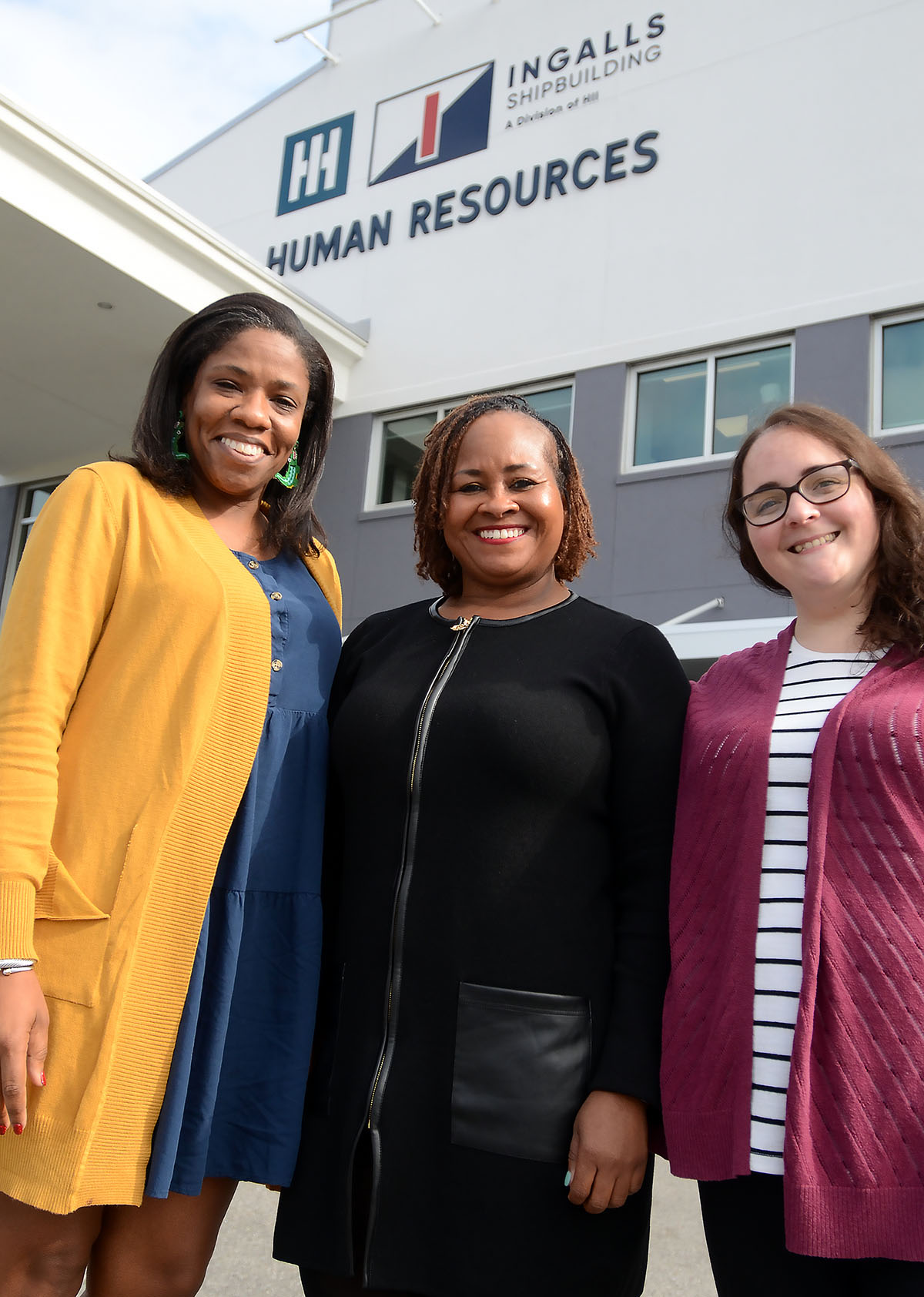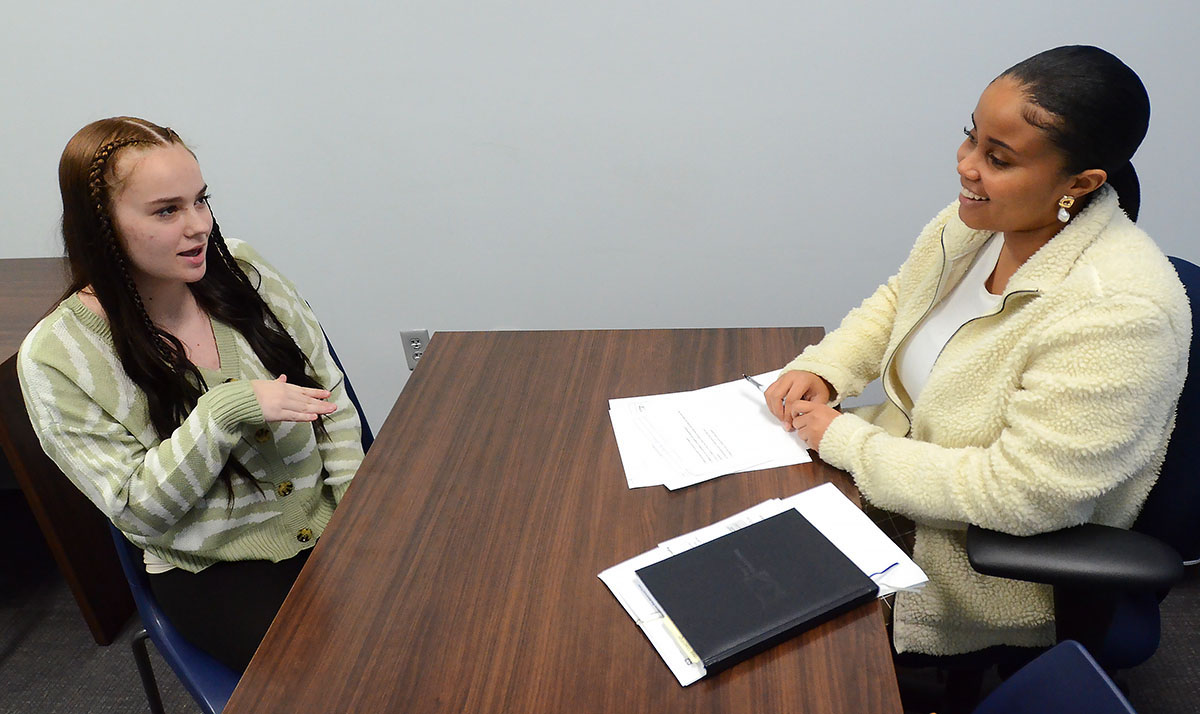Mississippi Today
Mississippi is investing millions of dollars in high school career coaches. Here’s how it works.

Mississippi is investing millions of dollars in high school career coaches. Here’s how it works.
PASCAGOULA – Aaliyah Jackson almost didn’t make it to her job interview at Ingalls Shipbuilding on a recent Monday morning.
The 18-year-old St. Martin High School senior was pumping gas when a faulty latch sent gasoline spraying all over her only professional dress. Panicked and shaking, she took out her phone and dialed the one person she knew would know what to do: Mrs. Marvin.
That’s her high school career coach. The one who helped her prepare for Ingalls’ first-ever high school career fair. Jackson hopes to land a job sandblasting ships.
“I don’t have a lot of professional clothes. So I texted her, having a panic attack, covered in gas, asking what I should do,” she said.
Brittini Marvin, per usual, knew what to say. She told Jackson to go home and clean up. She reminded her it would be ok, even if she missed the school bus taking students to the interviews.

After quickly washing her dress at home, Jackson made it on the bus on time to ride with her coach to the Ingalls offices. And Marvin wasn’t far during the whole process: cheering Jackson on between a written test, physical test and interview.
“I love her,” Jackson said. “I didn’t even know what a resume really was before I went to her office.”
Jackson County has one of the most thorough career coaching programs in the state that goes by the name “P3,” short for “purpose, passion, and paycheck.” The first iteration of a similar program launched about six years ago in northeast Mississippi, funded by grant money from Toyota.
The programs use career coaches hired from outside the school system — but stationed within a high school — to help students develop a post-grad plan. P3, for example, focuses on its students having one of “three Es”: enrollment (into higher education), employment, or enlistment.
Meanwhile, a statewide career coaching program has been steadily unrolling as a way to confront Mississippi’s ongoing struggles to increase the workforce participation rate and get young Mississippians into high-paying and in-demand jobs. Last session, the Legislature designated $8 million in American Sovereignty Restoration Act Funds for the statewide version of the program.
Now that funding could double. Gov. Tate Reeves’ legislative budget proposal included the recommendation to up the program’s funding to $16 million through general state funds.
The statewide program is run by the workforce development office, Accelerate Mississippi. The state had 25 coaches — including those in Jackson County — before last year’s funding. By mid-January, there will be 140 coaches, according to the workforce development office.
“We’ve been watching what’s happening in Jackson County and what had already been going on in the northeast part of the state,” said Garrett McInnis, Accelerate Mississippi’s deputy director of external affairs. “It was the right place and right time to expand the concept and now we have something that has the potential to positively impact a lot of people and make us more competitive as a state.”
The access to career coaches was vital for students like Jackson, who graduated early with a last day of school on Dec. 16. Without help to form a plan and set up a job for after graduation, Jackson worries she could have felt stuck at her current job at Taco Bell.

She is confident enough that she’d start training for a new job at Ingalls come January; she already put her two-weeks notice in at the fast-food joint.
Jackson County’s success over the last two years, with help from its local chamber of commerce and economic development office, has set a roadmap for the budding statewide program to follow. Career coaches say their advice is catered to every type of student — not just those looking for guidance for in-demand trades like at the Ingalls career fair.
“As career coaches we work with the private and public sectors,” said Amanda Stubbs, a coach at Gautier High School. “We have brought in Ingalls, Chevron, health care workers, counselors, attorneys. We take students on tours and to meet CEOs. The more our students know, the more they can grow.”
Ava McRaney, 17 and a senior at Vancleave High School, may be her class’ valedictorian but she still felt lost when it came to sorting out how to set up a path to become the first physician in her family. She wound up making an appointment with the school’s career coach, Kim Wiley.
“I don’t know if I would have been applied to colleges already if it wasn’t for her,” McRaney said.
Wiley set up for McRaney to talk to a medical student about exactly what steps to take during undergraduate college — even carving out what time of year to study for the MCATs — in order to make her dreams a reality.
“She walked away feeling confident, knowing this is exactly what I need to do,” Wiley said. “She has a plan in place and knows how to move forward.”
Through the program’s connections to the community, McRaney was able to meet Singing River hospital’s CEO and shadow surgeons in November.
“I loved every second of the surgeries and I couldn’t take my eyes off what was happening,” McRaney said. “I got to be in the actual operating room. It was just an awesome experience and if I didn’t have that, I’d probably still feel unsure of everything.”
McRaney already received an acceptance letter from the University of Mississippi. She hopes to one day be an orthopedic surgeon.
Valerie Jerde, 18 and an early-graduate senior at Pascagoula High School, was at Ingalls’ recent job fair applying to work as a joiner, or a ship’s craftsman. Jerde recently found out she is pregnant. She wants a well-paying career to provide for her new family.
“I could see myself growing at Ingalls,” she said. “But I have always been taught not to keep my eggs in one basket.”
That’s why she’s grateful for the strong connection she’s built with career coach Shunda Williams. Jerde says she knows the coach will be there if she needs career or life advice even when she’s no longer a student.

“She’s a role model,” Jerde said.
Unlike high school counselors, the career coaches salaries aren’t paid by the school district. They can’t get called in to proctor a test or substitute teach a class. Their schedule is fully dedicated to helping students plan career paths.
The American Schools Counselor Association recommends a ratio of 250 students to one counselor. In reality, the national average for that ratio is more like 415-to-1. The career coaches add to a student’s team to ensure fewer are leaving Mississippi high schools without a job or pathway to a job in place.
The coaches say they’re often intervening to help break cycles of poverty, whether that means buying interview clothes for a student who cannot afford their own or helping a family fill out a Free Application for Federal Student Aid (commonly called FAFSA) so a student can enroll in community college.
McInnis with Accelerate Mississippi said by January, 51 of Mississippi’s 82 counties will have career coaches in their schools.
“It’s not nearly enough,” he said. “We need more.
This article first appeared on Mississippi Today and is republished here under a Creative Commons license.
Mississippi Today
Derrick Simmons: Monday’s Confederate Memorial Day recognition is awful for Mississippians
Editor’s note: This essay is part of Mississippi Today Ideas, a platform for thoughtful Mississippians to share fact-based ideas about our state’s past, present and future. You can read more about the section here.
Each year, in a handful of states, public offices close, flags are lowered and official ceremonies commemorate “Confederate Memorial Day.”
Mississippi is among those handful of states that on Monday will celebrate the holiday intended to honor the soldiers who fought for the Confederacy during the Civil War.
But let me be clear: celebrating Confederate Memorial Day is not only racist but is bad policy, bad governance and a deep stain on the values we claim to uphold today.
First, there is no separating the Confederacy from the defense of slavery and white supremacy. The Confederacy was not about “states’ rights” in the abstract; it was about the right to own human beings. Confederate leaders themselves made that clear.
Confederate Vice President Alexander Stephens declared in his infamous “Cornerstone Speech” that the Confederacy was founded upon “the great truth that the negro is not equal to the white man.” No amount of revisionist history can erase the fact that the Confederacy’s cause was fundamentally rooted in preserving racial subjugation.
To honor that cause with a state holiday is to glorify a rebellion against the United States fought to defend the indefensible. It is an insult to every citizen who believes in equality and freedom, and it is a cruel slap in the face to Black Americans, whose ancestors endured the horrors of slavery and generations of systemic discrimination that followed.
Beyond its moral bankruptcy, Confederate Memorial Day is simply bad public policy. Holidays are public statements of our values. They are moments when a state, through official sanction, tells its citizens: “This is what we believe is worthy of honor.” Keeping Confederate Memorial Day on the calendar sends a message that a government once committed to denying basic human rights should be celebrated.
That message is not just outdated — it is dangerous. It nurtures the roots of racism, fuels division and legitimizes extremist ideologies that threaten our democracy today.
Moreover, there are real economic and administrative costs to shutting down government offices for this purpose. In a time when states face budget constraints, workforce shortages and urgent civic challenges, it is absurd to prioritize paid time off to commemorate a failed and racist insurrection. Our taxpayer dollars should be used to advance justice, education, infrastructure and economic development — not to prop up a lost cause of hate.
If we truly believe in moving forward together as one people, we must stop clinging to symbols that represent treason, brutality and white supremacy. There is a legislative record that supports this move in a veto-proof majority changing the state Confederate flag in 2020. Taking Confederate Memorial Day off our official state holiday calendar is another necessary step toward a more inclusive and just society.
Mississippi had the largest population of enslaved individuals in 1865 and today has the highest percentage of Black residents in the United States. We should not honor the Confederacy or Confederate Memorial Day. We should replace it.
Replacing a racist holiday with one that celebrates emancipation underscores the state’s rich African American history and promotes a more inclusive understanding of its past. It would also align the state’s observances with national efforts to commemorate the end of slavery and the ongoing pursuit of equality.
I will continue my legislative efforts to replace Confederate Memorial Day as a state holiday with Juneteenth, which commemorates the freedom for America’s enslaved people.
It’s time to end Confederate Memorial Day once and for all.
Derrick T. Simmons, D-Greensville, serves as the minority leader in the state Senate. He represents Bolivar, Coahoma and Washington counties in the Mississippi Senate.
This article first appeared on Mississippi Today and is republished here under a Creative Commons Attribution-NoDerivatives 4.0 International License.
The post Derrick Simmons: Monday's Confederate Memorial Day recognition is awful for Mississippians appeared first on mississippitoday.org
Note: The following A.I. based commentary is not part of the original article, reproduced above, but is offered in the hopes that it will promote greater media literacy and critical thinking, by making any potential bias more visible to the reader –Staff Editor.
Political Bias Rating: Left-Leaning
This article argues against the celebration of Confederate Memorial Day, stating it glorifies a racist and failed rebellion that is harmful to societal values. It critiques the holiday as a symbol of white supremacy and advocates for replacing it with Juneteenth to honor emancipation. The language used, such as referring to the Confederate cause as “moral bankruptcy,” and the call to replace the holiday reflects a progressive stance on social justice and racial equality, common in left-leaning perspectives. Additionally, the writer urges action for inclusivity and justice, positioning the argument within modern liberal values.
Mississippi Today
On this day in 1903, W.E.B. Du Bois urged active resistance to racist policies
April 27, 1903

W.E.B. Du Bois, in his book, “The Souls of Black Folk,” called for active resistance to racist policies: “We have no right to sit silently by while the inevitable seeds are sown for a harvest of disaster to our children, black and white.”
He described the tension between being Black and being an American: “One ever feels his twoness, — an American, a Negro; two souls, two thoughts, two unreconciled strivings; two warring ideals in one dark body, whose strength alone keeps it from being torn asunder.”
He criticized Washington’s “Atlanta Compromise” speech. Six years later, Du Bois helped found the NAACP and became the editor of its monthly magazine, The Crisis. He waged protests against the racist silent film “The Birth of a Nation” and against lynchings of Black Americans, detailing the 2,732 lynchings between 1884 and 1914.
In 1921, he decried Harvard University’s decisions to ban Black students from the dormitories as an attempt to renew “the Anglo-Saxon cult, the worship of the Nordic totem, the disenfranchisement of Negro, Jew, Irishman, Italian, Hungarian, Asiatic and South Sea Islander — the world rule of Nordic white through brute force.”
In 1929, he debated Lothrop Stoddard, a proponent of scientific racism, who also happened to belong to the Ku Klux Klan. The Chicago Defender’s front page headline read, “5,000 Cheer W.E.B. DuBois, Laugh at Lothrup Stoddard.”
In 1949, the FBI began to investigate Du Bois as a “suspected Communist,” and he was indicted on trumped-up charges that he had acted as an agent of a foreign state and had failed to register. The government dropped the case after Albert Einstein volunteered to testify as a character witness.
Despite the lack of conviction, the government confiscated his passport for eight years. In 1960, he recovered his passport and traveled to the newly created Republic of Ghana. Three years later, the U.S. government refused to renew his passport, so Du Bois became a citizen of Ghana. He died on Aug. 27, 1963, the eve of the March on Washington.
This article first appeared on Mississippi Today and is republished here under a Creative Commons Attribution-NoDerivatives 4.0 International License.![]()
Mississippi Today
Jim Hood’s opinion provides a roadmap if lawmakers do the unthinkable and can’t pass a budget
On June 30, 2009, Sam Cameron, the then-executive director of the Mississippi Hospital Association, held a news conference in the Capitol rotunda to publicly take his whipping and accept his defeat.
Cameron urged House Democrats, who had sided with the Hospital Association, to accept the demands of Republican Gov. Haley Barbour to place an additional $90 million tax on the state’s hospitals to help fund Medicaid and prevent the very real possibility of the program and indeed much of state government being shut down when the new budget year began in a few hours. The impasse over Medicaid and the hospital tax had stopped all budget negotiations.
Barbour watched from a floor above as Cameron publicly admitted defeat. Cameron’s decision to swallow his pride was based on a simple equation. He told news reporters, scores of lobbyists and health care advocates who had set up camp in the Capitol as midnight on July 1 approached that, while he believed the tax would hurt Mississippi hospitals, not having a Medicaid budget would be much more harmful.
Just as in 2009, the Legislature ended the 2025 regular session earlier this month without a budget agreement and will have to come back in special session to adopt a budget before the new fiscal year begins on July 1. It is unlikely that the current budget rift between the House and Senate will be as dramatic as the 2009 standoff when it appeared only hours before the July 1 deadline that there would be no budget. But who knows what will result from the current standoff? After all, the current standoff in many ways seems to be more about political egos than policy differences on the budget.
The fight centers around multiple factors, including:
- Whether legislation will be passed to allow sports betting outside of casinos.
- Whether the Senate will agree to a massive projects bill to fund local projects throughout the state.
- Whether leaders will overcome hard feelings between the two chambers caused by the House’s hasty final passage of a Senate tax cut bill filled with typos that altered the intent of the bill without giving the Senate an opportunity to fix the mistakes.
- Whether members would work on a weekend at the end of the session. The Senate wanted to, the House did not.
It is difficult to think any of those issues will rise to the ultimate level of preventing the final passage of a budget when push comes to shove.
But who knows? What we do know is that the impasse in 2009 created a guideline of what could happen if a budget is not passed.
It is likely that parts, though not all, of state government will shut down if the Legislature does the unthinkable and does not pass a budget for the new fiscal year beginning July 1.
An official opinion of the office of Attorney General Jim Hood issued in 2009 said if there is no budget passed by the Legislature, those services mandated in the Mississippi Constitution, such as a public education system, will continue.
According to the Hood opinion, other entities, such as the state’s debt, and court and federal mandates, also would be funded. But it is likely that there will not be funds for Medicaid and many other programs, such as transportation and aspects of public safety that are not specifically listed in the Mississippi Constitution.
The Hood opinion reasoned that the Mississippi Constitution is the ultimate law of the state and must be adhered to even in the absence of legislative action. Other states have reached similar conclusions when their legislatures have failed to act, the AG’s opinion said.
As is often pointed out, the opinion of the attorney general does not carry the weight of law. It serves only as a guideline, though Gov. Tate Reeves has relied on the 2009 opinion even though it was written by the staff of Hood, who was Reeves’ opponent in the contentious 2019 gubernatorial campaign.
But if the unthinkable ever occurs and the Legislature goes too far into a new fiscal year without adopting a budget, it most likely will be the courts — moreso than an AG’s opinion — that ultimately determine if and how state government operates.
In 2009 Sam Cameron did not want to see what would happen if a budget was not adopted. It also is likely that current political leaders do not want to see the results of not having a budget passed before July 1 of this year.
This article first appeared on Mississippi Today and is republished here under a Creative Commons Attribution-NoDerivatives 4.0 International License.
-

 SuperTalk FM6 days ago
SuperTalk FM6 days agoNew Amazon dock operations facility to bring 1,000 jobs to Marshall County
-

 News from the South - Missouri News Feed2 days ago
News from the South - Missouri News Feed2 days agoMissouri lawmakers on the cusp of legalizing housing discrimination
-

 News from the South - Alabama News Feed6 days ago
News from the South - Alabama News Feed6 days agoPrayer Vigil Held for Ronald Dumas Jr., Family Continues to Pray for His Return | April 21, 2025 | N
-

 News from the South - Florida News Feed6 days ago
News from the South - Florida News Feed6 days agoTrump touts manufacturing while undercutting state efforts to help factories
-

 News from the South - Texas News Feed7 days ago
News from the South - Texas News Feed7 days agoMeteorologist Chita Craft is tracking a Severe Thunderstorm Warning that's in effect now
-

 News from the South - Virginia News Feed7 days ago
News from the South - Virginia News Feed7 days agoTaking video of military bases using drones could be outlawed | Virginia
-

 News from the South - Florida News Feed6 days ago
News from the South - Florida News Feed6 days agoFederal report due on Lumbee Tribe of North Carolina’s path to recognition as a tribal nation
-

 Mississippi Today4 days ago
Mississippi Today4 days agoStruggling water, sewer systems impose ‘astronomic’ rate hikes













































